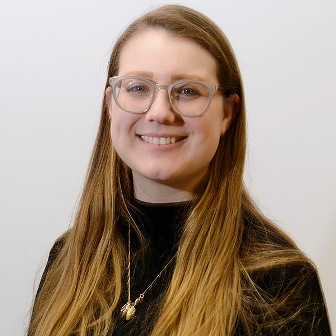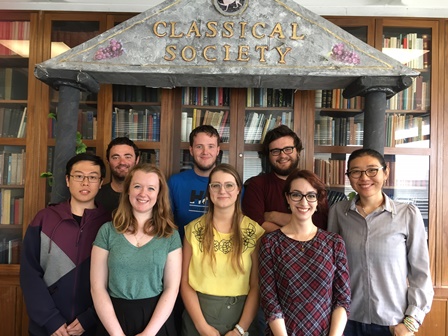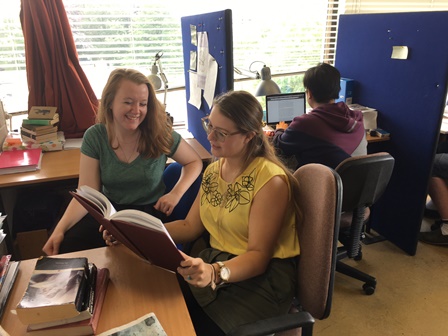MA in Classics
The MA in Classics can be taken full-time in
one year, or part-time over two years.
For further information go to myUCD
The MA programme consists of 90 credits (60 credits for a Graduate Diploma):
10 credits Research Skills
50 credits Seminar/language modules
30 credits Thesis
Recent seminar modules include:
Ancient Materialities; Exploring New Worlds;
Greek Political Thought; The Epic Tradition;
The Plays of Euripides; Warfare & Society
UCD School of Classics is home to the UCD Classical
Museum, the only museum of Classical Antiquities on the island of Ireland. This
unique collection of artefacts is regularly used for undergraduate and postgraduate
teaching.
The Museum is also open to the public.
UCD students who achieve a First Class GPA will qualify for a discretionary bursary worth €1000 towards their MA Classics fees.
Further information:
Email enquiries to: Dr Jo Day, Head of School (joanna.day@ucd.ie)
Structure
The MA in Classics at UCD is a Level 9, 90 ECTS degree. The programme consists of 40 credits of core modules and 50 credits of option modules. The core modules are two Research Skills modules and a thesis. Options are chosen from seminars and/or language modules, detailed below. The School uses a variety of assessment strategies at MA level that include oral presentation, extended essay, critical analysis, learning journal, podcast and artefact study. Some language modules are assessed by class tests and end-of-semester exams.
Seminar Modules (10 credits each)
The themes of the seminar modules reflect the research interests of the members of staff (NB – these options may vary depending on staff availability and student demand). Emphasis is on participation and debate in an informal small-group environment, and you will have the opportunity to engage closely with key primary and secondary material. You may take up to 50 credits of seminar modules during your MA.
- GRC40010 Warfare and Society (Dr Philip de Souza)
- GRC40190 The Epic Tradition (Dr Martin Brady)
- GRC40250 The Age of Marius and Sulla (Dr Alexander Thein)
- GRC40310 Political Thought (Dr Christopher Farrell)
- GRC40330 Exploring New Worlds (Dr Helen Dixon)
Options for the current academic year can be seen (opens in a new window)here.
No prior knowledge of ancient languages is required, and we offer beginners’ modules in both Latin and ancient Greek. If you have already studied ancient Greek or Latin, you can take our Advanced Language modules, which provide you with the opportunity to work on unadapted texts. You may take up to 40 credits of Greek and/or Latin from the (opens in a new window)list of modules that the School offers, so the MA in Classics at UCD offers an excellent opportunity for students to read widely in these languages. Language modules are strongly recommended for anyone intending to proceed to a research degree.
The thesis is an opportunity to conduct your own research, and so is the most rewarding aspect of the programme. You will write 12,000 – 15,000 words on a topic of your choosing relating to any aspect of the ancient world. During your programme of study you will work closely with your assigned thesis supervisor, who will have research expertise in this area. We encourage students to think about possible thesis topics before they arrive in September, so please feel free to consult any member of staff in advance. Research interests of our staff can be seen here. The thesis is due for submission at the end of your MA programme, in August. Examples of recent MA theses include:
- The Comic Female Stereotype in Classical Athens
- Beekeeping in Ancient Greece
- James Joyce’s Classical Background and his Use of Ancient Satire
- Debt in Second and First Century BC Rome
- Philhellenism and Felicitas in Plutarch’s Life of Lucullus
- Punishments of Mutinies in the Roman Army
- Conspicuous Construction: Monumentality and the Mycenaean Collapse of 1200 BC
- Cicero’s Use of Humour in his Pro Murena and Pro Caelio Speeches
It is possible to study for the MA in Classics full time over one year (code Z044) or part-time over two years (code Z105). As a full-time student, you will take two 5-credit Research Skills modules in the Autumn Trimester and a 30-credit thesis module. In addition, you may take one 10-credit seminar module and one 10-credit language module per semester. If you are not taking a language option, you may take two seminar modules in each semester instead.
As a part-time student, in your first year you must take two 5-credit Research Skills modules in the first trimester and at least two further 10-credit options (either seminar or language modules). In the second year you will take the 30-credit thesis module plus enough seminar and/or language modules to complete your 90 credits.
It is possible to exit the MA programme with a 60-credit Graduate Diploma in Classics if you are unable to complete your thesis.
The minimum qualification for admission to the MA in Classics at UCD is an upper second class (II.1 = GPA 3.08) or equivalent in an appropriate degree. It may be possible on occasion to make offers to applicants who do not meet these criteria, subject to references, informal interview and availability of places. Potential students with alternative experiences may also be considered, and should contact us for further information. Non-native English speakers must demonstrate an overall IELTS score of 6.5 or above, with no band lower than 6.0 (or equivalent). A (opens in a new window)pre-sessional programme or pre-masters programme in intensive English for academic purposes is available for conditional offer holders who do not meet the admission requirements.
Application is online via (opens in a new window)UCD Graduate Admissions. To apply you will need to fill in the online form and pay the administration fee, list two referees, and include a c.500 word personal statement. Your BA results/transcripts will also be required once you have graduated.
The deadline for applications for a September start in each academic year is the 30th June of that year, although late applications may be considered subject to availability of places. Please contact the School Graduate Coordinator in the first instance if you are seeking to make a late application.
For more information or queries, please contact the School of Classics Graduate Studies Co-ordinator, Dr Conor Trainor (opens in a new window)conor.trainor1@ucd.ie / +353 1 716 8011) or the School of Classics office (tasneem.filaih@ucd.ie / +353 1 716 8166). The UCD Graduate Open Day is an annual event for prospective postgraduates, but we are happy to show you around or talk to you about any aspect of the programme or UCD at other times too – let us know when you’ll be in Dublin!
For more general information about postgraduate studies in UCD, see Graduate Admissions.
Students from outside Ireland will find further useful information at UCD Global.
For information about fees for the MA in Classics, please visit UCD Fees. The Graduate Admissions Fees, Funding and Scholarships page may also be useful.
The School of Classics offers two 50% and four 25% fee remission scholarships to outstanding non-EU applicants. Your application will automatically be assessed and your offer letter will include any scholarship. Please note: to be considered for one of these awards, you must apply before April 30th.
A UCD student who has achieved the best mark in Latin, Greek, or Greek and Roman Civilisation (and which must be a First) in their BA degree and who continues to a MA programme here will be considered for a BA Graduate Scholarship. Some North American students may be eligible for Federal Loans to study at UCD.
MA students are eligible to apply for the annual travel bursaries awarded by the Irish Institute of Hellenic Studies at Athens, which support a period of thesis-related research in Greece.
An MA in Classics can serve as an end in itself or will prepare you for the more advanced research required for doctoral studies. The skills you acquire in data collection, critical analysis, written and oral presentation are all highly valued by employers across a wide range of fields, and our graduates have found employment in careers in the heritage and museum sector, education, archaeology, civil service, IT, media and banking.

Kaylin Bednarz, USA, MA in Classics 2017
“The UCD School of Classics appealed to me because of the structure of the Master’s programme, and especially its Classical Museum. The museum is a fantastic resource that I was able to utilise both in class and on a volunteer basis. Being able to study the artifacts first hand is a benefit to anyone interested in museums, archaeology, and Classics. The faculty is open to student involvement, and this greatly impacted me during my time in the museum, as I was encouraged to research and publish an article about some of the museum collection. The overall support of the faculty is extraordinary and they have created an environment that helps students thrive. The MA in Classics at UCD is perfect for anyone interested in the classical world.”
For further information on the MA, please click (opens in a new window)here.
UCD College of Arts and Humanities Graduate School
(opens in a new window)UCD Students' Union
(opens in a new window)Conflict Resolution

